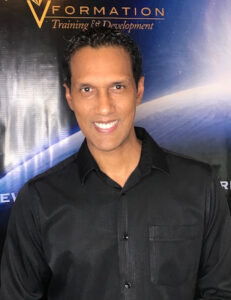
Blog
Your “Voice” Matters!
Imagine that you are in a meeting and a colleague says something that you disagree with. Your gut feeling is telling you that you should say something, because if you don’t, the team may go down the wrong path. However, you are thinking that if you express disagreement, it may affect the relationship. What should you do?
I realize that there are some individuals who are always ready to express themselves but unfortunately, that doesn’t apply to everyone.
Expressing an opinion, especially if it disrupts the status quo or deciding to have a necessary conversation, especially a difficult one, can be challenging for some. However, as Daniel Pink stated,
“Everything good in life— a great business, a great romance, a powerful social movement— begins with a conversation.”
I’m not suggesting that every conversation will have such a life-changing impact, but there’s plenty of evidence out there that demonstrates how conversations possessing the right criteria, whether they start as an opinion or question can change a perspective, alter a course, and sometimes, make all the difference.
Here are 3 factors that allow you to have more control:
1. Choose to express yourself
To what extent do you suppress your needs to avoid conflict? To what extent do you suppress your emotions to protect relationships?
Choosing to express your opinion matters because it is a reflection of your unique perspective, experiences, and values. Everyone brings a different set of experiences and insights to the table, and by sharing your thoughts, you contribute to a richer and more inclusive conversation.
Within the corporate world, we continue to hear about the importance of “Diversity, Equity, and Inclusion (DEI)” globally. Usually, this revolves around demographic diversity. However, my “go to” when I hear about diversity is diversity of thought, which doesn’t contradict demographic diversity but rather accompanies it.
Choosing to express yourself allows others to see and know who you are as an individual, rather than possibly making assumptions based on your group, your role, or your background. Diverse thinking can uncover blind spots, challenge assumptions, and lead to more effective and sustainable solutions.
Will expressing yourself sometimes cause conflict? YES, but it has the potential to drive your personal growth as well as your team’s engagement in CONVERSATIONS and therefore the ability to make decisions and solve problems.
2. Get Your Timing Right
Timing is crucial when deciding to express your options. I will list some self-explanatory things to consider here to increase your impact:
Context: Make sure the timing aligns with the context and goals of the conversation. Consider what else is happening in the organization or someone’s personal life.
Readiness: Are the participants ready to engage meaningfully? If someone is stressed, distracted, or unprepared, the conversation might be less effective.
Urgency: If the topic requires immediate attention, the timing should reflect that. Otherwise, choose and communicate a time when everyone can focus.
Availability: Find a time when everyone involved can be present without other commitments. This can help avoid interruptions and allow for a more thorough discussion.
Sensitivity: For sensitive topics, ensure there’s enough privacy and that the timing respects the emotional state of the participants.
Choosing the right timing can greatly influence the effectiveness of a conversation when you decide to have it, impacting both the outcome as well as your confidence.
Ok, so you have chosen to express yourself, analyzed if the timing is right so now for the kicker……
3. Align Authenticity and Responsibility
The word “authenticity” has been taunting me lately—not because it’s meaningless, but because it’s often used carelessly, without real depth or clarity. We hear things like “Be yourself,” “Be real,” or “Speak your truth,” tossed around as quick definitions. But rarely do those phrases come with a caveat that seems painfully obvious: Don’t be a jerk about it.
It begs the question—does authenticity include respect for others?
According to Psychology Today, authenticity is about aligning your actions with your core values and beliefs in pursuit of your true self. Tullio Siragusa adds, “Authenticity is about living in alignment with your true self… expressing your thoughts, beliefs, and emotions genuinely, without succumbing to societal pressures.”
Fair enough. But do you notice what’s missing in both definitions? Any mention of how our authenticity impacts other people.
Let’s consider a scenario:
If someone says they’re “just being real” while speaking to me in a tone that’s aggressive or dismissive, how likely am I to hear them out?
Not very.
In fact, I might be so put off by their delivery that I never even bother to understand who they are or what they’re trying to say.
Now ask the same question with a twist:
If they express their views authentically but respectfully—can we still disagree and maintain connection?
Absolutely. And in that space, real conversation becomes possible.
Authenticity Without Emotional Intelligence Is Just Self-Centeredness
Here’s the truth we often avoid: authenticity isn’t just about you.
Being authentic doesn’t give you a free pass to bulldoze people emotionally or ignore the impact of your words. That’s not honesty—that’s recklessness dressed up as virtue.
In reality, authenticity and integrity go hand in hand. And integrity isn’t just about being true to yourself—it’s about how you show up in the world, especially when someone else is on the receiving end of your truth.
As Brené Brown reminds us:
“When we don’t care at all what people think and we’re immune to hurt, we’re also ineffective at connecting.”
Real courage, she says, is telling your story while staying vulnerable—not emotionally detached or armored with anger. It’s about sharing who you are without weaponizing it.
Being True to Yourself ≠ Being Indifferent to Others
Even Gabor Maté, in advocating for reclaiming our authenticity, acknowledges that the fear of rejection often keeps us inauthentic. But that doesn’t mean the answer is emotional blunt force trauma. It means learning how to express ourselves without abandoning our relationships—or ourselves—in the process.
Yes, people might still be offended by your truth. You can’t control that.
But you can control how you deliver it. And that’s where emotional intelligence becomes the real backbone of authenticity.
So the next time someone tells you to “just be real,” remember:
Authenticity without empathy is just ego in disguise.
 Respect others, yes, but expressing ourselves doesn’t mean that others will not be offended at times. You simply don’t have total control over that and in some cases, you will have to leave it at that.
Respect others, yes, but expressing ourselves doesn’t mean that others will not be offended at times. You simply don’t have total control over that and in some cases, you will have to leave it at that.
Final Thoughts
In the journey toward personal and professional growth, it is important to strike a balance between the choice to express yourself and the harmony you seek. Expressing yourself is not just about getting your message across, it is influencing others to listen so that you can be understood. Without your “voice”, valuable insights and perspectives might remain unheard, and progress could stagnate. Ultimately, your “voice” has the power to make a difference, both for yourself and for those around you.

Tony Ragoonanan is the Founder of V-Formation Training & Development. As a Performance Management Specialist and Emotional Intelligence Trainer, he helps individuals and organizations to align people, frameworks and outcomes. Outside of this, it’s all about family, football, and fitness!!
868-681-3492 | tonyr0909@gmail.com




Leave a reply